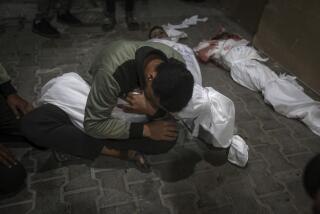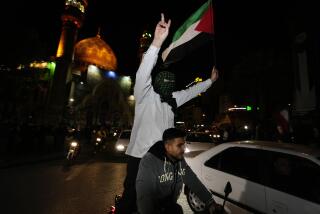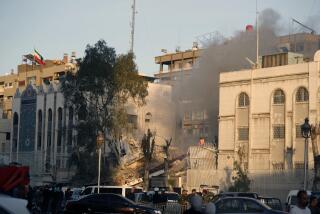Israel Launches F-16 Raids After Suicide Bomb
An Islamic suicide bomber and Israeli fighter jets wreaked new death and destruction across Israel and Palestinian territories Friday, one of the bloodiest days yet in nearly eight months of escalating warfare.
Israeli F-16 warplanes screamed into the skies above the West Bank and Gaza Strip, hitting targets in three Palestinian cities, reducing paramilitary posts to rubble and killing at least nine security personnel. The airstrikes were launched in retaliation for a suicide bombing at a crowded Israeli shopping mall earlier Friday that claimed six lives and wounded more than 100 adults and children.
It was the first time Israel had used such warplanes against Palestinian targets in the West Bank and Gaza since the 1967 Middle East War.
Israeli Prime Minister Ariel Sharon, under enormous domestic pressure to quell Palestinian violence, blamed the shopping mall bombing on Palestinian Authority President Yasser Arafat and ordered the aerial assault after an emergency Cabinet meeting.
The Palestinians “must know the military price they will pay for terrorism is very high,” Cabinet Minister Danny Naveh said, claiming that the dramatic escalation was a matter of “self-defense.”
The radical Islamic group Hamas claimed responsibility for the bombing. Israeli officials maintain that Arafat, who has improved ties with Hamas, holds the ultimate responsibility. The intended targets of the air raids--two alleged masterminds of attacks on Israelis--are reported to have escaped.
In addition to the suicide bombing, Palestinian gunmen killed an Israeli army officer while he was driving home with his mother to a Jewish settlement in the West Bank. His mother was seriously wounded in the ambush.
All told, 16 Israelis and Palestinians were killed Friday and about 170 people wounded. The carnage inflamed tensions to an alarming height and crippled fleeting attempts to find a diplomatic way out of the crisis.
In Washington, President Bush decried “suicide bombers that have disregard for themselves and obviously for innocent folks.” Secretary of State Colin L. Powell called for a “cessation of violence by all” and pleaded for leaders in the Middle East and elsewhere to more forcefully speak out against the escalating conflict.
The day’s killing began in the coastal town of Netanya, north of Tel Aviv and less than 10 miles from the Palestinian-ruled West Bank. Israelis have been bracing for serious terrorist attacks, and Friday’s proved devastating.
On the busiest shopping day of the week, families preparing for the Jewish Sabbath were flocking to the central Sharon Mall when several noticed a suspicious-looking man: a skinny, mustachioed Arab with cold eyes and a bulky blue coat concealing, it turned out, a belt of explosives.
The coat was out of place in the Mediterranean heat, thought Shibolet Aboudi, a teenager on her way to buy a used car with her father, Dudu.
“Daddy,” Shibolet said. “Look! It’s a terrorist.”
Her father frantically called police on his cell phone, but help did not arrive in time. Instead, the man wrapped in explosives walked calmly back and forth outside the mall and then to the main entrance, where he detonated the bomb when he realized that security guards were on to him.
“I looked him in the eye and he blew himself up,” security guard Lior Kamisa said later from his hospital bed. “He just exploded and disintegrated right in front of me.”
The explosion shook the entire block. Broken glass, shredded parcels, an overturned baby stroller, pieces of clothing and bodies littered the sidewalk in front of the Art Deco facade of the Sharon Mall in the center of town.
There have been numerous terror bombings in Netanya and other Israeli cities and towns since the Palestinian revolt erupted in the West Bank and Gaza Strip last September. But Friday’s was the most deadly in years.
“It bent me over,” said 18-year-old Sharon Karonki, who had dropped film off at the mall, the town’s largest shopping center. “When I looked up, I saw the security guard standing there with his pants burned off his body. I saw a guy running away, covered in blood. People were screaming, running around in shock. Others were just lying on the ground, paralyzed with fear. I just stood there.”
Shalom Zioni, a 60-year-old who walks to the mall regularly for exercise as he recovers from a stroke, was knocked to the ground by the force of the blast. He had almost reached the entrance.
“If I had been able to walk faster, I would be dead now,” he said, weeping, at the hospital. “Every time I close my eyes, I see a vision of red. I see people without arms and legs.”
“I stood there, petrified, shaking, and a woman ran in screaming, carrying a baby in her arms who was bleeding,” said Suzanne Amar, who was inside the mall when the blast occurred.
The dead Israelis included three women and two men. The wife and 5-year-old son of one victim were seriously injured.
Hours after the blast, a knot of angry bystanders watched from across the street as emergency personnel continued the cleanup of shattered glass and broken steel beams, and rubber-gloved ultra-Orthodox men combed and swabbed the area for the tiniest fragments of human flesh and blood, as is required by their religious views.
Young men demanded death to Arabs, or at least their expulsion. Netanya residents said they now live in fear and with the deepening belief that peace will never be possible.
News of the bombing was broadcast on loudspeakers in Palestinian mosques after Friday prayers, to a roar of celebratory cheers. The bomber, identified as Mahmoud Ahmed Marmash, 21, was from the West Bank town of Tulkarm, about 10 miles east of Netanya. He reportedly left sweets for his family before taking off to seek martyrdom.
Though Israel has been in a heightened state of alert for months and Palestinians are generally banned from entering Israel, the border is not hermetic. Thousands of people cross back and forth, legally or otherwise.
Hamas, which claimed responsibility for the bombing, said Israel was “reaping the suffering it has sown” and vowed that its campaign of suicide bombings will continue. Hamas also was exacting revenge for Israel’s slaying of five Palestinian policemen earlier this week.
Israel struck back fast and hard.
F-16 fighter jets fired missiles on targets in the West Bank cities of Nablus and Ramallah, as well as in Gaza City. With helicopter gunships, Israel also hit Tulkarm, the suicide bomber’s hometown.
In Nablus, Palestinian police and rescue crews frantically dug through a pile of rubble, all that was left of a central security compound. They plucked bodies and limbs from the site, which had contained a prison holding Mahmoud Abu Hanoud, a Hamas militant implicated by Israel in numerous terrorist bombings. Abu Hanoud eluded Israeli capture last year, and he escaped Friday’s attack, Nablus residents said. His whereabouts were unknown. Eight guards or other police officers were killed in the bombardment.
In Ramallah, a headquarters of the Force 17 presidential guard, a unit especially loyal to Arafat but accused by Israel of numerous shooting and terrorist attacks, was hit. One officer was killed. Israeli television said the intended target there was Mahmoud Damra, the city’s Force 17 commander, who was not hurt.
In Gaza, Israeli aircraft unleashed more than 25 missiles at the coast guard and other security offices near Arafat’s seaside compound, but no deaths were reported. Apparently, much of the compound had been evacuated shortly after the Netanya bombing in anticipation of retaliation. A Cabinet meeting had to be canceled when many of Arafat’s ministers could not reach Gaza.
Until now, airstrikes had been carried out by Apache helicopter gunships. By shifting to faster warplanes, Israel sends a far tougher message, can deliver a more powerful punch and also minimizes the risk from surface-to-air missiles, which the Israeli military now assumes the Palestinians possess.
In response to the Netanya bombing, Arafat’s office released a statement condemning the killing of any innocent civilians, Israeli or Palestinian.
But Israelis dismissed the statement as meaningless. Anger ran high.
“The military pressure has to be stepped up, and Arafat must be prevented from reaching any diplomatic achievement from terror,” said Naveh, the Israeli minister. “If the Israeli air force is using fighter jets for the first time, it does not mean it’s the last time.”
Foreign Minister Shimon Peres, the only senior government official actively seeking to revive peace negotiations, also seemed moved to despair. Israeli television quoted the normally incorrigible optimist as saying the nation was in its gravest situation since its 1948 war for independence.
“Every day we have 15 or 20 acts of terror,” Peres told reporters. “It reduces very much the necessary trust for going back to negotiations.”
On that one point, the Palestinian leadership agreed.
Nabil abu Rudaineh a senior Arafat advisor, said: “Violence will only bring more violence.”
*
Curtius reported from Netanya and Wilkinson from Jerusalem.
More to Read
Start your day right
Sign up for Essential California for news, features and recommendations from the L.A. Times and beyond in your inbox six days a week.
You may occasionally receive promotional content from the Los Angeles Times.






